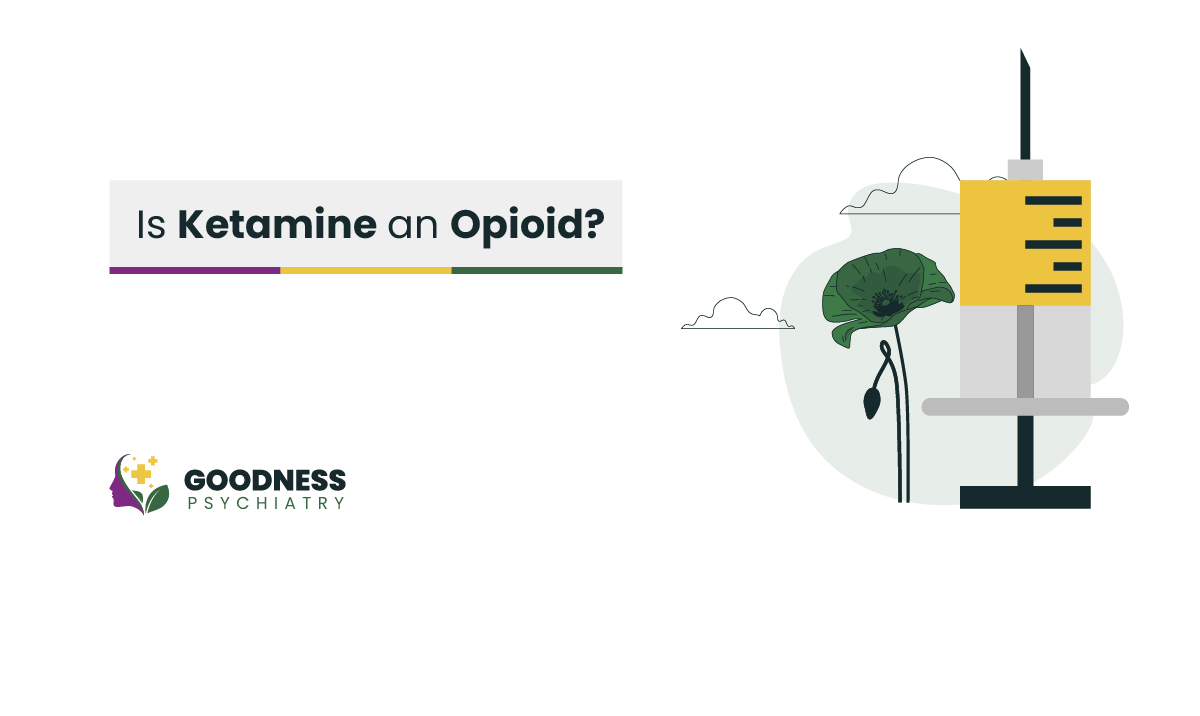Is Ketamine an Opioid? Ketamine isn’t an opioid. Ketamine, like opioids, causes sedation (relaxation and sleepiness). It can also cause dissociative symptoms, hallucinations, and amnesia (loss of memory while on the drug). It has potential for abuse according to the Drug Enforcement Administration.
That is why it’s a controlled substance. To get more information about ketamine therapy and its treatment, you may visit Goodness Psychiatry.
How Ketamine Works?
NMDA receptors in the brain are blocked by ketamine. Glutamate, a neurotransmitter that regulates pain perception, learning and memory, is usually acted upon by them. Ketamine’s mechanism of action involves blocking these receptors which induces a change in signal transduction due altered release of neurotransmitters in the neural pathways of the brain. This disruption causes reduction of pain sensation and can lead to dissociative anaesthesia that has some therapeutic benefits for mental illnesses such as PTSD or severe depression.
Contact us to learn more about ketamine therapy and its treatment.
Effects of Ketamine on the Body
Ketamine can lead to euphoria and depersonalization. In addition, it modifies perception by enhancing colors or making sounds louder. Nevertheless, these benefits are transient, lasting only approximately an hour. When administered in medical contexts, Ketamine causes drowsiness, pain alleviation, and muscular relaxation. It also possesses amnesic qualities, which are helpful for traumatic or immobilizing operations. The following are some possible adverse effects of Ketamine:
- Elevated heart rate and blood pressure.
- Nausea and vomiting.
- Orientation and confusion.
Ketamine and its Impacts on the Brain
Although it has potential medical uses, ketamine’s effects on the brain go beyond its immediate impact on NMDA receptors and transmitter release. It is an interesting discovery that ketamine has the potential to stimulate neurogenesis in a way that can counteract chronic stress-induced diseases and depression. Interestingly, it could be said to affect neuroplasticity of the brain, thus being hopeful towards improving moods and cognitive function for patients suffering from treatment-resistant depression. However, long-term consequences of ketamine on both brain structure and functioning are still under investigation as regards to its therapeutic effects and negative ones if any.
Is Ketamine an Opioid?
No, ketamine is not an opioid. It’s a dissociative anesthetic. It also has analgesic (pain-killing) properties along with hallucinogenic and dissociative effects similar to dextromethorphan (DXM) or PCP. It’s a commonly abused party drug. It’s also an anesthetic used by veterinarians due to its potency.
Research indicates it’s also an antidepressant, and recently, the FDA has approved Spravato for prescription by a physician for this purpose (i.e., treatment-resistant depression), which cannot be controlled with traditional medications.
Side Effects of Ketamine
Some other prevalent adverse effects of Ketamine include:
- Nausea or vomiting
- Feeling faint
- Diplopia (double vision)
- Tiredness
- Dysphoria is an uncomfortable or disturbed mental condition
- Confusion
Final Thoughts
Is Ketamine an Opioid? It is not considered an opioid, but it has some traits common with opioids. Ketamine is considered a restricted substance.
Still, it is a Schedule III prohibited substance, whereas most opioids are Schedule II due to the increased risk of abuse and dependence. If you’re looking for ketamine therapy, you should consider the care of Goodness Psychiatry.
Frequently Asked Questions
How many ketamine treatments for depression?
The usual approach for using ketamine to treat depression includes getting six infusions spread out over two to three weeks.
Does ketamine therapy get you high?
It’s a common question! Ketamine therapy, when administered under the supervision of a healthcare professional, is at a much lower dose than recreational use.
While some patients report feeling light-headed or experiencing mild dissociation during treatment, the aim is therapeutic—not to induce a ‘high’.
How long does ketamine work for?
When used for therapeutic purposes like treating depression, the mood-boosting effects can last from a few days to a few weeks after a single dose.


No comment